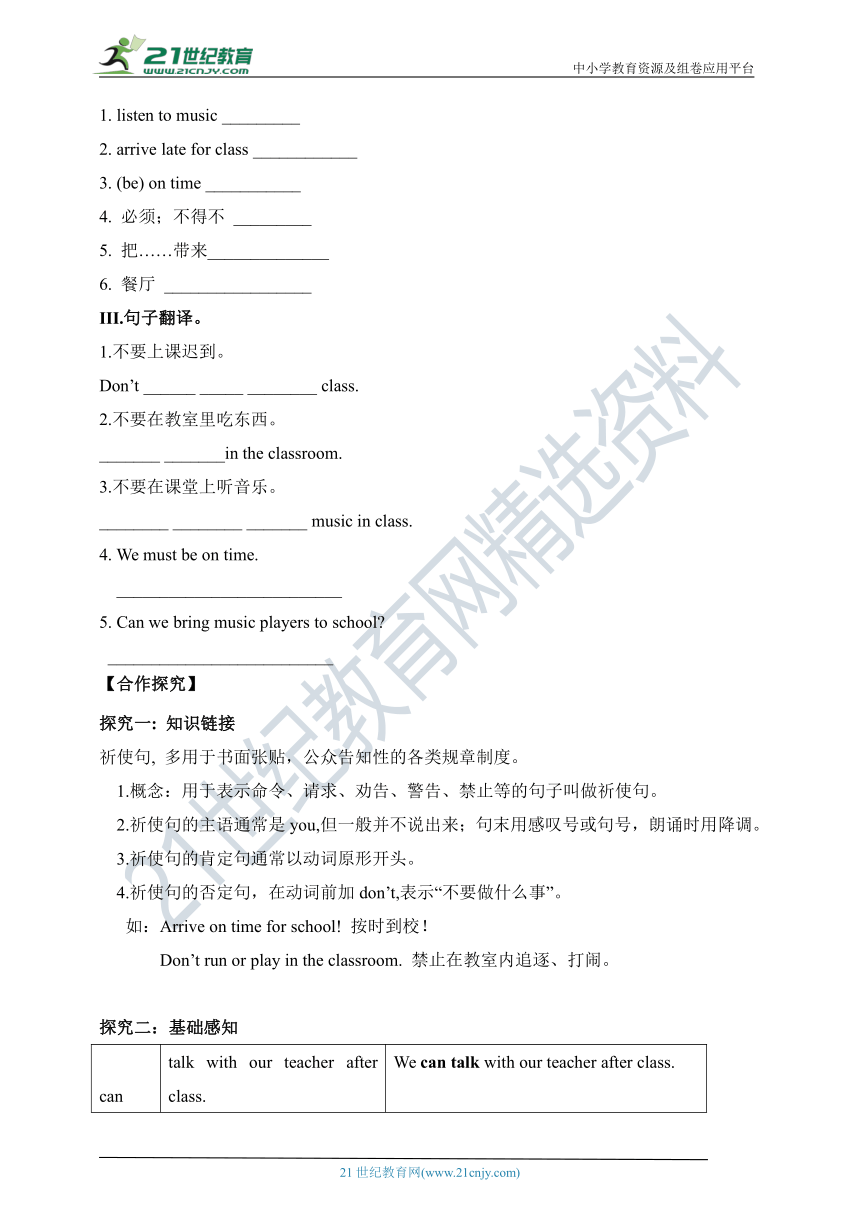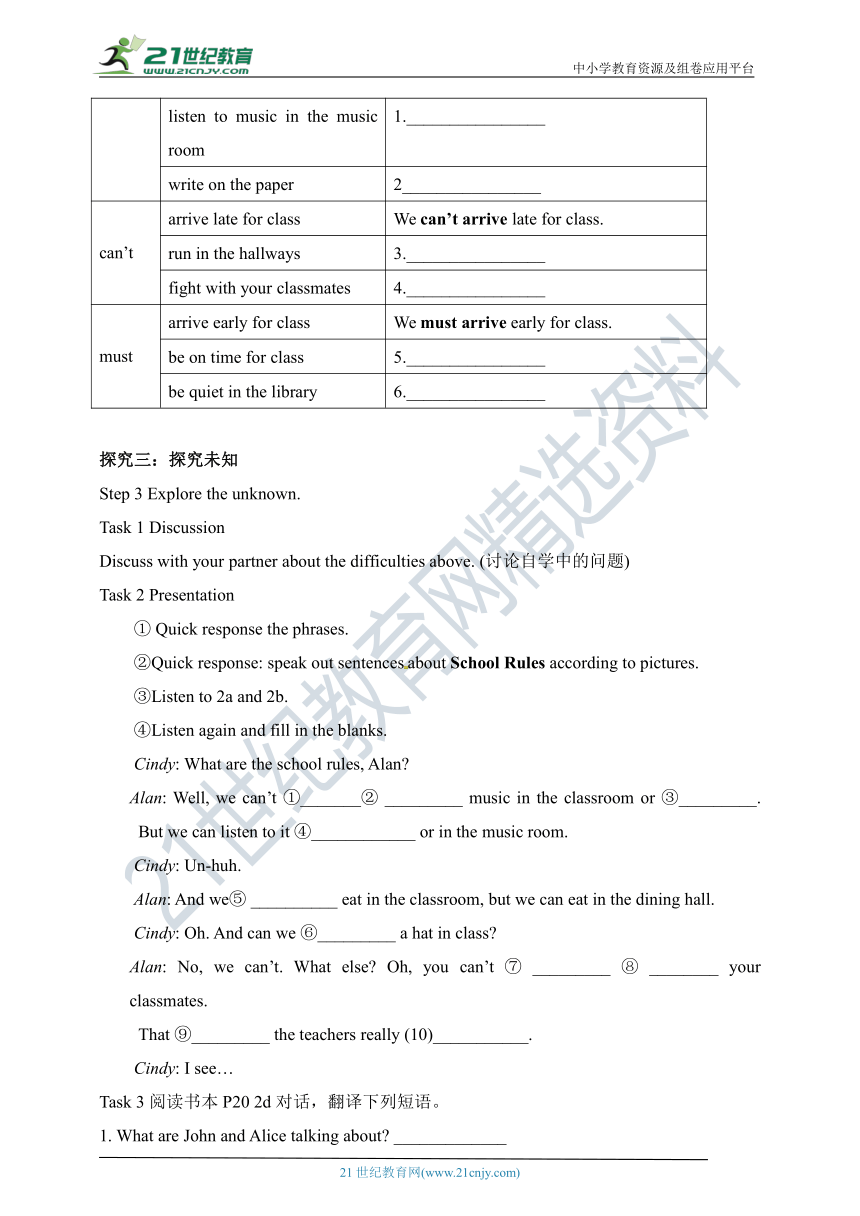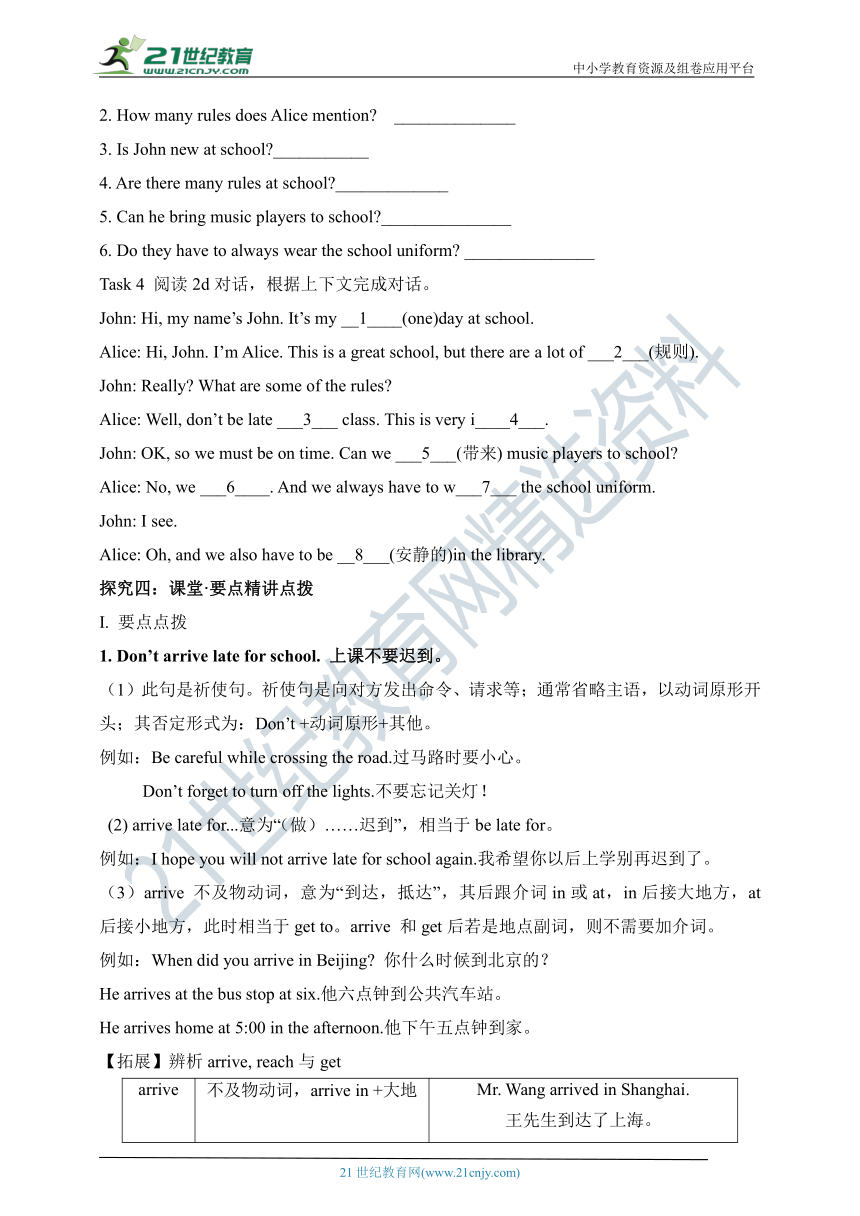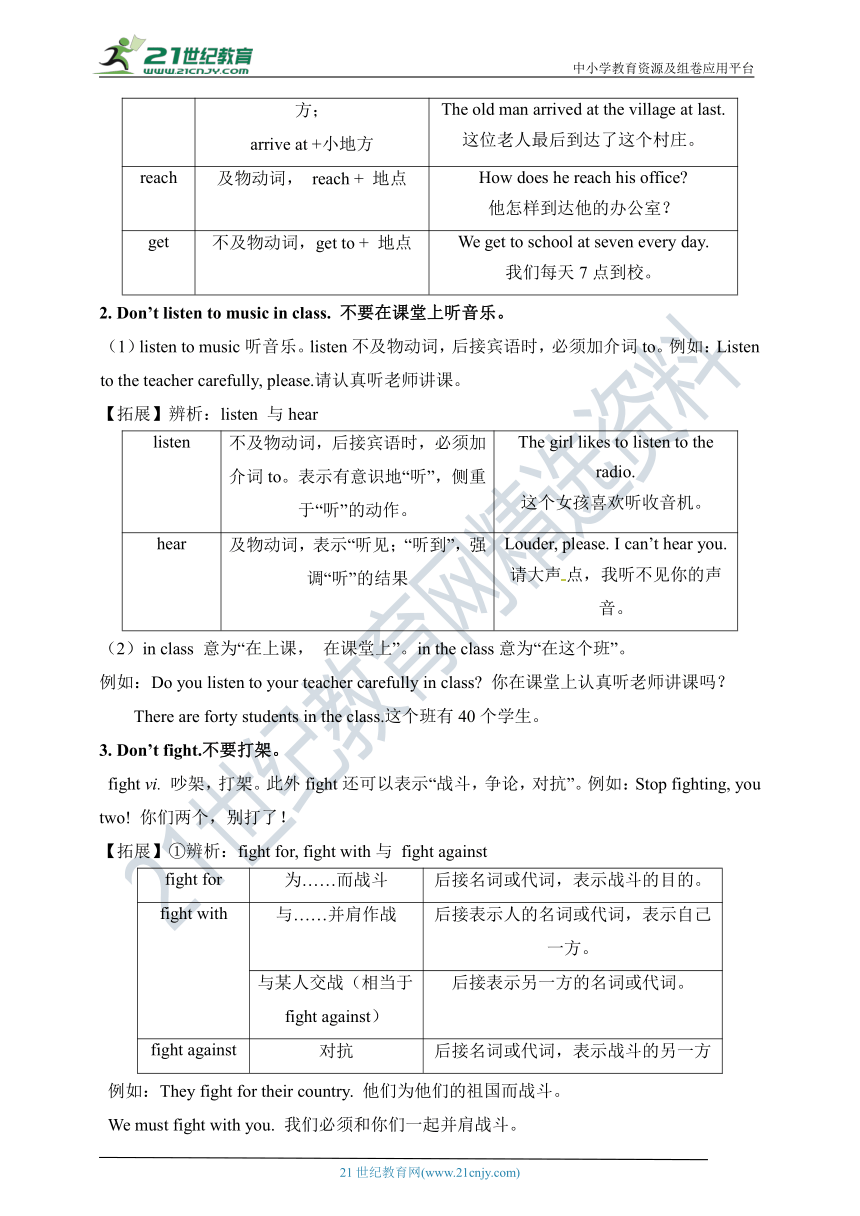Unit 4 Don’t eat in class Section A 1 (1a-2d) 同步优学案(含答案)
文档属性
| 名称 | Unit 4 Don’t eat in class Section A 1 (1a-2d) 同步优学案(含答案) |

|
|
| 格式 | doc | ||
| 文件大小 | 1.3MB | ||
| 资源类型 | 试卷 | ||
| 版本资源 | 人教新目标(Go for it)版 | ||
| 科目 | 英语 | ||
| 更新时间 | 2021-02-20 00:00:00 | ||
图片预览





文档简介
中小学教育资源及组卷应用平台
Unit 4 Don’t eat in class.
Section A 1 (1a-2d)
【学习目标】
1. 掌握以下单词:rules, arrive, late, hall, dining hall, listen, listen to, fight, sorry
2. 掌握以下句型:① Don't eat in class. ② You must be on time. ③ Eat in the dining hall.
3. 学会用英语表达一些标志的含义。
4. 学会祈使句情态动词can/can’t/must的正确用法的正确用法。
5. 熟练使用目标语言谈论对某些规章制度(校规、家规等)的看法。
6. 用英语表达和制定一些简单的规则,理解没有规矩不成方圆;无论是在学校时还是在家庭中以及以后走上社会都应当遵守规则,按规则办事。
7. 理解、掌握、运用目标语言,学会方法, 提高心智水平。在任务型活动中感知,体验, 参与, 实践, 从中获得知识,发展能力。
【重点和难点】
重点:
1. 肯定祈使句是省略掉主语的原形动词开头;
2. 否定祈使句则是在肯定祈使句前加上“don’t”。
3. 情态动词must及have to在用法上的区别。
4. 学习掌握本节课的生词和短语;
5. 巩固祈使句的用法;
6. 情态动词can表示许可的肯定句、否定句、一般疑问句及肯定、否定回答。
7. 提高听说能力, 能和同学谈论校规, 如何谈论规则。
8. 情态动词must及have to在用法上的区别
【课前预习】
I. 单词速记。
1. rule__________ 2. hall________
3. important 4. arrive_________
5.listen 6.fight ______
7.在外面 8. 安静的 ____
9.穿,戴 10. 带来,取来 ___
II. 短语互译。
1. listen to music _________
2. arrive late for class ____________
3. (be) on time ___________
4. 必须;不得不 _________
5. 把……带来______________
6. 餐厅 _________________
III.句子翻译。
1.不要上课迟到。
Don’t ______ _____ ________ class.
2.不要在教室里吃东西。
_______ _______in the classroom.
3.不要在课堂上听音乐。
________ ________ _______ music in class.
4. We must be on time.
__________________________
5. Can we bring music players to school?
__________________________
【合作探究】
探究一: 知识链接
祈使句, 多用于书面张贴,公众告知性的各类规章制度。
1.概念:用于表示命令、请求、劝告、警告、禁止等的句子叫做祈使句。
2.祈使句的主语通常是you,但一般并不说出来;句末用感叹号或句号,朗诵时用降调。
3.祈使句的肯定句通常以动词原形开头。
4.祈使句的否定句,在动词前加don’t,表示“不要做什么事”。
如:Arrive on time for school! 按时到校!
Don’t run or play in the classroom. 禁止在教室内追逐、打闹。
探究二:基础感知
can talk with our teacher after class. We can talk with our teacher after class.
listen to music in the music room 1.________________
write on the paper 2________________
can’t arrive late for class We can’t arrive late for class.
run in the hallways 3.________________
fight with your classmates 4.________________
must arrive early for class We must arrive early for class.
be on time for class 5.________________
be quiet in the library 6.________________
探究三:探究未知
Step 3 Explore the unknown.
Task 1 Discussion
Discuss with your partner about the difficulties above. (讨论自学中的问题)
Task 2 Presentation
① Quick response the phrases.
②Quick response: speak out sentencesabout School Rules according to pictures.
③Listen to 2a and 2b.
④Listen again and fill in the blanks.
Cindy: What are the school rules, Alan?
Alan: Well, we can’t ①_______② _________ music in the classroom or ③_________. But we can listen to it ④____________ or in the music room.
Cindy: Un-huh.
Alan: And we⑤ __________ eat in the classroom, but we can eat in the dining hall.
Cindy: Oh. And can we ⑥_________ a hat in class?
Alan: No, we can’t. What else? Oh, you can’t ⑦ _________ ⑧ ________ your classmates.
That ⑨_________ the teachers really (10)___________.
Cindy: I see…
Task 3阅读书本P20 2d对话,翻译下列短语。
1. What are John and Alice talking about? _____________
2. How many rules does Alice mention? ______________
3. Is John new at school?___________
4. Are there many rules at school?_____________
5. Can he bring music players to school?_______________
6. Do they have to always wear the school uniform? _______________
Task 4 阅读2d对话,根据上下文完成对话。
John: Hi, my name’s John. It’s my __1____(one)day at school.
Alice: Hi, John. I’m Alice. This is a great school, but there are a lot of ___2___(规则).
John: Really? What are some of the rules?
Alice: Well, don’t be late ___3___ class. This is very i____4___.
John: OK, so we must be on time. Can we ___5___(带来) music players to school?
Alice: No, we ___6____. And we always have to w___7___ the school uniform.
John: I see.
Alice: Oh, and we also have to be __8___(安静的)in the library.
探究四:课堂·要点精讲点拨
I. 要点点拨
1. Don’t arrive late for school. 上课不要迟到。
(1)此句是祈使句。祈使句是向对方发出命令、请求等;通常省略主语,以动词原形开头;其否定形式为:Don’t +动词原形+其他。
例如:Be careful while crossing the road.过马路时要小心。
Don’t forget to turn off the lights.不要忘记关灯!
(2) arrive late for...意为“(做)……迟到”,相当于be late for。
例如:I hope you will not arrive late for school again.我希望你以后上学别再迟到了。
(3)arrive 不及物动词,意为“到达,抵达”,其后跟介词in或at,in后接大地方,at后接小地方,此时相当于get to。arrive 和get后若是地点副词,则不需要加介词。
例如:When did you arrive in Beijing? 你什么时候到北京的?
He arrives at the bus stop at six.他六点钟到公共汽车站。
He arrives home at 5:00 in the afternoon.他下午五点钟到家。
【拓展】辨析arrive, reach与get
arrive 不及物动词,arrive in +大地方;
arrive at +小地方 Mr. Wang arrived in Shanghai.
王先生到达了上海。
The old man arrived at the village at last.
这位老人最后到达了这个村庄。
reach 及物动词, reach + 地点 How does he reach his office?
他怎样到达他的办公室?
get 不及物动词,get to + 地点 We get to school at seven every day.
我们每天7点到校。
2. Don’t listen to music in class. 不要在课堂上听音乐。
(1)listen to music听音乐。listen不及物动词,后接宾语时,必须加介词to。例如:Listen to the teacher carefully, please.请认真听老师讲课。
【拓展】辨析:listen 与hear
listen 不及物动词,后接宾语时,必须加介词to。表示有意识地“听”,侧重于“听”的动作。 The girl likes to listen to the radio.
这个女孩喜欢听收音机。
hear 及物动词,表示“听见;“听到”,强调“听”的结果 Louder, please. I can’t hear you.
请大声点,我听不见你的声音。
(2)in class 意为“在上课, 在课堂上”。in the class意为“在这个班”。
例如:Do you listen to your teacher carefully in class? 你在课堂上认真听老师讲课吗?
There are forty students in the class.这个班有40个学生。
3. Don’t fight.不要打架。
fight vi. 吵架,打架。此外fight还可以表示“战斗,争论,对抗”。例如:Stop fighting, you two! 你们两个,别打了!
【拓展】①辨析:fight for, fight with与 fight against
fight for 为……而战斗 后接名词或代词,表示战斗的目的。
fight with 与……并肩作战 后接表示人的名词或代词,表示自己一方。
与某人交战(相当于fight against) 后接表示另一方的名词或代词。
fight against 对抗 后接名词或代词,表示战斗的另一方
例如:They fight for their country. 他们为他们的祖国而战斗。
We must fight with you. 我们必须和你们一起并肩战斗。
Why do you sometimes fight with others? 你为什么有时和别人打架?
I’ll fight against you. 我会反抗你。
② fight n. 打仗,战斗,打架,战斗力,斗志,常用于短语have a fight,意为“打架”,have a fight with sb.意为“与某人打架”。
例如:They had a fight last night.昨晚他们打了一架。
4. Can we bring music players to school? 我们可以带音乐播放器到学校吗?
bring vt. 带来;拿来;取来。bring…to把……带来。
例如:Bring your book here tomorrow, please. 明天请把你的书带到这儿来。
【拓展】辨析 take 与bring
①bring及物动词,意为“带来;拿来;取来”,指从别处把某人或某物带到或拿到说话者所在的地点来。例如:Can you bring me an umbrella? 你能给我带把雨伞来吗?
②take 意为“带走,取走”,表示把某物或某人从说话的地方带到另一个地方去。词意和 bring相对,经常和介词 to 搭配。
例如:Take him to hospital at once, please. 请马上带他去医院。
II. 趁热打铁
1. He is never ______ class.
A. arrive B. late for C. arrive late D. late
2. Tom ______ to school very early every day.
A. arrives B. gets C. reaches D. arrive
3. My sister is ______music, I can _______beautiful songs from her study.
A. listening to, hear B. hearing, listen C. hearing, listen to D. listening, hear
4. As a Chinese, I think I must fight _______our country.
A. with B. to C. in D. for
5. Please _____ EXO’s photos to our classroom. Let us have a look at.
A. bring B. take C. to bring D. to take
【课时小结】
重点单词
rule n. 规则;规章
arrive v. 到达
hallway n. 廊;过道
hall n. 大厅;礼堂
listen v. 听;倾听
fight v.&n. 打架;战斗
sorry adj. 抱歉的;难过的;惋惜的
outside adv. 在外面adj.外面的
wear v. 穿;戴
important adj. 要的
bring v. 拿来取来
uniform n. 校服;制服
quiet adj. 安静的
重点词组
(be) on time准时
listen to…听……
arrive late for 迟到
重点句式
1.Don’t arrive late for class. You must be on time.上课不准迟到,你必须准时到校。
2.We can’t listen to music in the hallways, but we can listen to it outside.
我们不能在走廊上听音乐,但我们可以在外面听音乐。
【达标检测】
Ⅰ.根据句意及汉语或图片提示填写单词。
1.The ________(规则) of the game are very easy.
2.My father usually ________(到达) at his work place at 7:10 a.m.
3.Eric never ________(打架) with his brother.
4.Our school has a new________.
5.I'm ________(抱歉的) that I'm late.
Ⅱ.用方框中所给单词或短语的适当形式填空。
listen to,on time,arrive,wear,important
6.We can't ________ late for class.
7.School rules are very ________ to us.
8.Jane always ________ school uniforms.
9.Please get to school ________.
10.We can't ________ music in class.
Ⅲ.单项选择。
( )11—Must we take out the trash(倒垃圾)now?
—________.You can do it after class.
A.Yes, you must B.No, you can't
C.Yes, you may D.No, you needn’t
( )12.—________ run in the hallways, Mike.
—Sorry,Ms. Clark.
A.Don't B.Please C.Let's
( )13.We ________school at 7:00 every day.
A.get B.go C.arrive D.arrive at
( )14.Does he have to ________home now?
A.went B.goes C.go D.going
( )15.He's never ________class.
A.arrive B.late for C.arrive late D.late
Ⅳ.根据汉语意思完成句子,每空一词。
16.明天请准时到达这里。
Please be here ________ ________ tomorrow.
17.不要在图书馆讲话。
________ ________ in the library.
18.我们上课不能迟到。
We ________ ________ ________ ________class.
19.琳达睡觉前经常听音乐。
Linda often ________ ________ ________ before going to bed.
20.他们必须在音乐室唱歌。
They ________ ________ in the music room.
【教师寄语】
Time, Time again, I ask myself
【自我评价】
1. 本课我学会了什么?
_________________________________________________________________
2. 通过本课的学习,我还有哪些疑问?
_________________________________________________________________
参考答案:
【课前预习】
I. 单词速记。
1. 规则,规章 2. 大厅,礼堂 3. 重要的 4. 到达 5. 听;倾听
6. 打架,战斗 7. outside 8. quiet 9. wear 10. bring
II. 短语互译。
1. 听音乐 2. 上课迟到 3. 准时 4. have to 5. bring ...to 6. dining hall
III.句子翻译。
1.be late for 2. Don’t eat 3. Don’t listen to
4. 我们必须准时。 5. 我们可以带音乐播放器到学校吗?
【合作探究】
探究二
1. We can listen to music in the music room
2. We can write on the paper
3. We can’t run in the hallways
4. We can’t fight with your classmates
5. We must be on time for class
6. We must be quiet in the library
探究三
Task 2
1. listen 2. to 3. hallways 4. outside 5. can't
6. wear 7. fight 8. with 9. makes 10. unhappy
Task 3
1. School rules.
2. Four rules.
3. Yes, he is.
4. Yes, there are.
5. No, he can’t.
6. Yes, they do.
Task 4
1. first 2. rules 3. for 4. important 5. bring 6. can’t 7. wear 8. quiet
探究四:BBADA
【达标检测】
Ⅰ.1. rules 2. arrives 3. fights 4. hall 5. sorry
Ⅱ.6. arrive 7. important 8. wears 9. on time 10. listen to
Ⅲ.11-15 DADCB
Ⅳ.16.on time 17.Don't talk 18.can't be/arrive late for
19.listens to music 20.must sing
_21?????????è?????(www.21cnjy.com)_
Unit 4 Don’t eat in class.
Section A 1 (1a-2d)
【学习目标】
1. 掌握以下单词:rules, arrive, late, hall, dining hall, listen, listen to, fight, sorry
2. 掌握以下句型:① Don't eat in class. ② You must be on time. ③ Eat in the dining hall.
3. 学会用英语表达一些标志的含义。
4. 学会祈使句情态动词can/can’t/must的正确用法的正确用法。
5. 熟练使用目标语言谈论对某些规章制度(校规、家规等)的看法。
6. 用英语表达和制定一些简单的规则,理解没有规矩不成方圆;无论是在学校时还是在家庭中以及以后走上社会都应当遵守规则,按规则办事。
7. 理解、掌握、运用目标语言,学会方法, 提高心智水平。在任务型活动中感知,体验, 参与, 实践, 从中获得知识,发展能力。
【重点和难点】
重点:
1. 肯定祈使句是省略掉主语的原形动词开头;
2. 否定祈使句则是在肯定祈使句前加上“don’t”。
3. 情态动词must及have to在用法上的区别。
4. 学习掌握本节课的生词和短语;
5. 巩固祈使句的用法;
6. 情态动词can表示许可的肯定句、否定句、一般疑问句及肯定、否定回答。
7. 提高听说能力, 能和同学谈论校规, 如何谈论规则。
8. 情态动词must及have to在用法上的区别
【课前预习】
I. 单词速记。
1. rule__________ 2. hall________
3. important 4. arrive_________
5.listen 6.fight ______
7.在外面 8. 安静的 ____
9.穿,戴 10. 带来,取来 ___
II. 短语互译。
1. listen to music _________
2. arrive late for class ____________
3. (be) on time ___________
4. 必须;不得不 _________
5. 把……带来______________
6. 餐厅 _________________
III.句子翻译。
1.不要上课迟到。
Don’t ______ _____ ________ class.
2.不要在教室里吃东西。
_______ _______in the classroom.
3.不要在课堂上听音乐。
________ ________ _______ music in class.
4. We must be on time.
__________________________
5. Can we bring music players to school?
__________________________
【合作探究】
探究一: 知识链接
祈使句, 多用于书面张贴,公众告知性的各类规章制度。
1.概念:用于表示命令、请求、劝告、警告、禁止等的句子叫做祈使句。
2.祈使句的主语通常是you,但一般并不说出来;句末用感叹号或句号,朗诵时用降调。
3.祈使句的肯定句通常以动词原形开头。
4.祈使句的否定句,在动词前加don’t,表示“不要做什么事”。
如:Arrive on time for school! 按时到校!
Don’t run or play in the classroom. 禁止在教室内追逐、打闹。
探究二:基础感知
can talk with our teacher after class. We can talk with our teacher after class.
listen to music in the music room 1.________________
write on the paper 2________________
can’t arrive late for class We can’t arrive late for class.
run in the hallways 3.________________
fight with your classmates 4.________________
must arrive early for class We must arrive early for class.
be on time for class 5.________________
be quiet in the library 6.________________
探究三:探究未知
Step 3 Explore the unknown.
Task 1 Discussion
Discuss with your partner about the difficulties above. (讨论自学中的问题)
Task 2 Presentation
① Quick response the phrases.
②Quick response: speak out sentencesabout School Rules according to pictures.
③Listen to 2a and 2b.
④Listen again and fill in the blanks.
Cindy: What are the school rules, Alan?
Alan: Well, we can’t ①_______② _________ music in the classroom or ③_________. But we can listen to it ④____________ or in the music room.
Cindy: Un-huh.
Alan: And we⑤ __________ eat in the classroom, but we can eat in the dining hall.
Cindy: Oh. And can we ⑥_________ a hat in class?
Alan: No, we can’t. What else? Oh, you can’t ⑦ _________ ⑧ ________ your classmates.
That ⑨_________ the teachers really (10)___________.
Cindy: I see…
Task 3阅读书本P20 2d对话,翻译下列短语。
1. What are John and Alice talking about? _____________
2. How many rules does Alice mention? ______________
3. Is John new at school?___________
4. Are there many rules at school?_____________
5. Can he bring music players to school?_______________
6. Do they have to always wear the school uniform? _______________
Task 4 阅读2d对话,根据上下文完成对话。
John: Hi, my name’s John. It’s my __1____(one)day at school.
Alice: Hi, John. I’m Alice. This is a great school, but there are a lot of ___2___(规则).
John: Really? What are some of the rules?
Alice: Well, don’t be late ___3___ class. This is very i____4___.
John: OK, so we must be on time. Can we ___5___(带来) music players to school?
Alice: No, we ___6____. And we always have to w___7___ the school uniform.
John: I see.
Alice: Oh, and we also have to be __8___(安静的)in the library.
探究四:课堂·要点精讲点拨
I. 要点点拨
1. Don’t arrive late for school. 上课不要迟到。
(1)此句是祈使句。祈使句是向对方发出命令、请求等;通常省略主语,以动词原形开头;其否定形式为:Don’t +动词原形+其他。
例如:Be careful while crossing the road.过马路时要小心。
Don’t forget to turn off the lights.不要忘记关灯!
(2) arrive late for...意为“(做)……迟到”,相当于be late for。
例如:I hope you will not arrive late for school again.我希望你以后上学别再迟到了。
(3)arrive 不及物动词,意为“到达,抵达”,其后跟介词in或at,in后接大地方,at后接小地方,此时相当于get to。arrive 和get后若是地点副词,则不需要加介词。
例如:When did you arrive in Beijing? 你什么时候到北京的?
He arrives at the bus stop at six.他六点钟到公共汽车站。
He arrives home at 5:00 in the afternoon.他下午五点钟到家。
【拓展】辨析arrive, reach与get
arrive 不及物动词,arrive in +大地方;
arrive at +小地方 Mr. Wang arrived in Shanghai.
王先生到达了上海。
The old man arrived at the village at last.
这位老人最后到达了这个村庄。
reach 及物动词, reach + 地点 How does he reach his office?
他怎样到达他的办公室?
get 不及物动词,get to + 地点 We get to school at seven every day.
我们每天7点到校。
2. Don’t listen to music in class. 不要在课堂上听音乐。
(1)listen to music听音乐。listen不及物动词,后接宾语时,必须加介词to。例如:Listen to the teacher carefully, please.请认真听老师讲课。
【拓展】辨析:listen 与hear
listen 不及物动词,后接宾语时,必须加介词to。表示有意识地“听”,侧重于“听”的动作。 The girl likes to listen to the radio.
这个女孩喜欢听收音机。
hear 及物动词,表示“听见;“听到”,强调“听”的结果 Louder, please. I can’t hear you.
请大声点,我听不见你的声音。
(2)in class 意为“在上课, 在课堂上”。in the class意为“在这个班”。
例如:Do you listen to your teacher carefully in class? 你在课堂上认真听老师讲课吗?
There are forty students in the class.这个班有40个学生。
3. Don’t fight.不要打架。
fight vi. 吵架,打架。此外fight还可以表示“战斗,争论,对抗”。例如:Stop fighting, you two! 你们两个,别打了!
【拓展】①辨析:fight for, fight with与 fight against
fight for 为……而战斗 后接名词或代词,表示战斗的目的。
fight with 与……并肩作战 后接表示人的名词或代词,表示自己一方。
与某人交战(相当于fight against) 后接表示另一方的名词或代词。
fight against 对抗 后接名词或代词,表示战斗的另一方
例如:They fight for their country. 他们为他们的祖国而战斗。
We must fight with you. 我们必须和你们一起并肩战斗。
Why do you sometimes fight with others? 你为什么有时和别人打架?
I’ll fight against you. 我会反抗你。
② fight n. 打仗,战斗,打架,战斗力,斗志,常用于短语have a fight,意为“打架”,have a fight with sb.意为“与某人打架”。
例如:They had a fight last night.昨晚他们打了一架。
4. Can we bring music players to school? 我们可以带音乐播放器到学校吗?
bring vt. 带来;拿来;取来。bring…to把……带来。
例如:Bring your book here tomorrow, please. 明天请把你的书带到这儿来。
【拓展】辨析 take 与bring
①bring及物动词,意为“带来;拿来;取来”,指从别处把某人或某物带到或拿到说话者所在的地点来。例如:Can you bring me an umbrella? 你能给我带把雨伞来吗?
②take 意为“带走,取走”,表示把某物或某人从说话的地方带到另一个地方去。词意和 bring相对,经常和介词 to 搭配。
例如:Take him to hospital at once, please. 请马上带他去医院。
II. 趁热打铁
1. He is never ______ class.
A. arrive B. late for C. arrive late D. late
2. Tom ______ to school very early every day.
A. arrives B. gets C. reaches D. arrive
3. My sister is ______music, I can _______beautiful songs from her study.
A. listening to, hear B. hearing, listen C. hearing, listen to D. listening, hear
4. As a Chinese, I think I must fight _______our country.
A. with B. to C. in D. for
5. Please _____ EXO’s photos to our classroom. Let us have a look at.
A. bring B. take C. to bring D. to take
【课时小结】
重点单词
rule n. 规则;规章
arrive v. 到达
hallway n. 廊;过道
hall n. 大厅;礼堂
listen v. 听;倾听
fight v.&n. 打架;战斗
sorry adj. 抱歉的;难过的;惋惜的
outside adv. 在外面adj.外面的
wear v. 穿;戴
important adj. 要的
bring v. 拿来取来
uniform n. 校服;制服
quiet adj. 安静的
重点词组
(be) on time准时
listen to…听……
arrive late for 迟到
重点句式
1.Don’t arrive late for class. You must be on time.上课不准迟到,你必须准时到校。
2.We can’t listen to music in the hallways, but we can listen to it outside.
我们不能在走廊上听音乐,但我们可以在外面听音乐。
【达标检测】
Ⅰ.根据句意及汉语或图片提示填写单词。
1.The ________(规则) of the game are very easy.
2.My father usually ________(到达) at his work place at 7:10 a.m.
3.Eric never ________(打架) with his brother.
4.Our school has a new________.
5.I'm ________(抱歉的) that I'm late.
Ⅱ.用方框中所给单词或短语的适当形式填空。
listen to,on time,arrive,wear,important
6.We can't ________ late for class.
7.School rules are very ________ to us.
8.Jane always ________ school uniforms.
9.Please get to school ________.
10.We can't ________ music in class.
Ⅲ.单项选择。
( )11—Must we take out the trash(倒垃圾)now?
—________.You can do it after class.
A.Yes, you must B.No, you can't
C.Yes, you may D.No, you needn’t
( )12.—________ run in the hallways, Mike.
—Sorry,Ms. Clark.
A.Don't B.Please C.Let's
( )13.We ________school at 7:00 every day.
A.get B.go C.arrive D.arrive at
( )14.Does he have to ________home now?
A.went B.goes C.go D.going
( )15.He's never ________class.
A.arrive B.late for C.arrive late D.late
Ⅳ.根据汉语意思完成句子,每空一词。
16.明天请准时到达这里。
Please be here ________ ________ tomorrow.
17.不要在图书馆讲话。
________ ________ in the library.
18.我们上课不能迟到。
We ________ ________ ________ ________class.
19.琳达睡觉前经常听音乐。
Linda often ________ ________ ________ before going to bed.
20.他们必须在音乐室唱歌。
They ________ ________ in the music room.
【教师寄语】
Time, Time again, I ask myself
【自我评价】
1. 本课我学会了什么?
_________________________________________________________________
2. 通过本课的学习,我还有哪些疑问?
_________________________________________________________________
参考答案:
【课前预习】
I. 单词速记。
1. 规则,规章 2. 大厅,礼堂 3. 重要的 4. 到达 5. 听;倾听
6. 打架,战斗 7. outside 8. quiet 9. wear 10. bring
II. 短语互译。
1. 听音乐 2. 上课迟到 3. 准时 4. have to 5. bring ...to 6. dining hall
III.句子翻译。
1.be late for 2. Don’t eat 3. Don’t listen to
4. 我们必须准时。 5. 我们可以带音乐播放器到学校吗?
【合作探究】
探究二
1. We can listen to music in the music room
2. We can write on the paper
3. We can’t run in the hallways
4. We can’t fight with your classmates
5. We must be on time for class
6. We must be quiet in the library
探究三
Task 2
1. listen 2. to 3. hallways 4. outside 5. can't
6. wear 7. fight 8. with 9. makes 10. unhappy
Task 3
1. School rules.
2. Four rules.
3. Yes, he is.
4. Yes, there are.
5. No, he can’t.
6. Yes, they do.
Task 4
1. first 2. rules 3. for 4. important 5. bring 6. can’t 7. wear 8. quiet
探究四:BBADA
【达标检测】
Ⅰ.1. rules 2. arrives 3. fights 4. hall 5. sorry
Ⅱ.6. arrive 7. important 8. wears 9. on time 10. listen to
Ⅲ.11-15 DADCB
Ⅳ.16.on time 17.Don't talk 18.can't be/arrive late for
19.listens to music 20.must sing
_21?????????è?????(www.21cnjy.com)_
同课章节目录
- Unit 1 Can you play the guitar?
- Section A
- Section B
- Unit 2 What time do you go to school?
- Section A
- Section B
- Unit 3 How do you get to school?
- Section A
- Section B
- Unit 4 Don't eat in class.
- Section A
- Section B
- Unit 5 Why do you like pandas?
- Section A
- Section B
- Unit 6 I'm watching TV.
- Section A
- Section B
- Review of Units 1-6
- Unit 7 It's raining!
- Section A
- Section B
- Unit 8 Is there a post office near here?
- Section A
- Section B
- Unit 9 What does he look like?
- Section A
- Section B
- Unit 10 I'd like some noodles.
- Section A
- Section B
- Unit 11 How was your school trip?
- Section A
- Section B
- Unit 12 What did you do last weekend?
- Section A
- Section B
